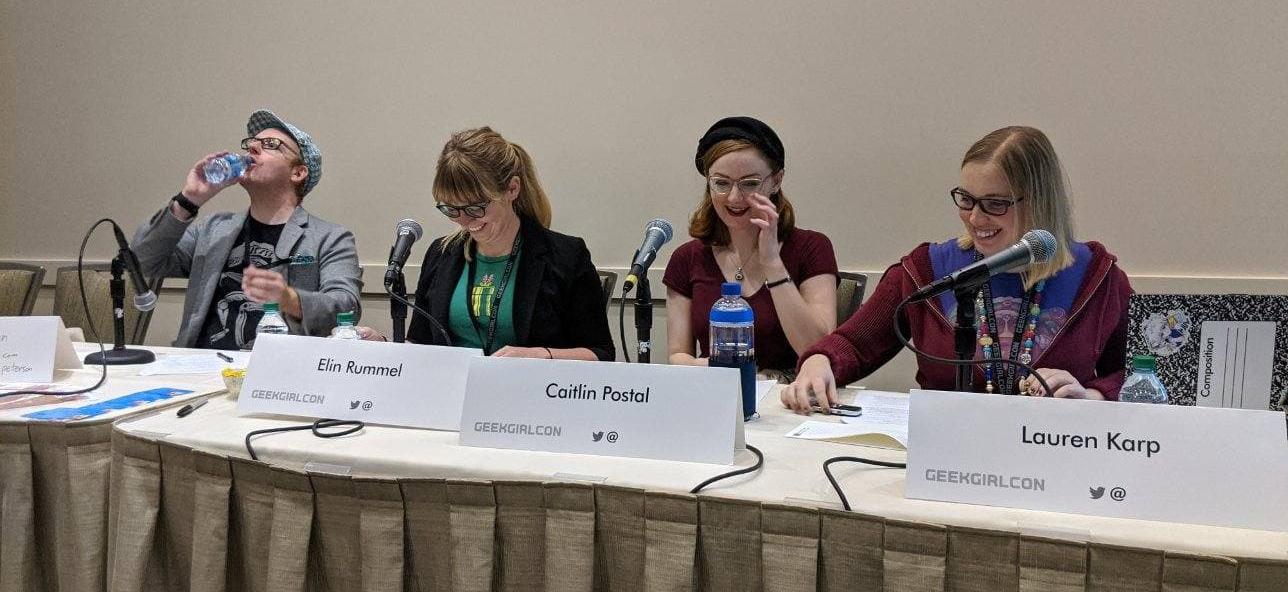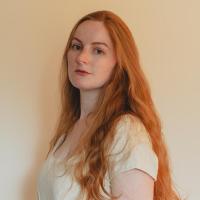
If we are firmly committed to reimagining what the PhD can look like (and I, at least, am), it’s important to adjust our training for and recognition of non-traditional avenues for scholarship (including publication venues and presentation opportunities). We must advocate for an academic environment that sees the value in different kinds of approaches, so that the call for public scholarship serves as more than simply performative.
In 2019, I spoke on a panel about representations of teaching and pedagogy in genre media. I and my fellow panelists, which included organizer Lauren Karp, along with presenters Elin Rummel and Evan Peterson, offered perspectives on pop culture’s representations of pedagogy—perspectives rooted in our own experiences as both educators and fans. I shared a pointed critique on the teaching practices at Hogwarts, while closely examining Chidi Anagonye’s student-centered philosophy lessons on NBC’s The Good Place. The room was packed with people of all ages and backgrounds, from tenured faculty to tweens and their parents.
Despite the pedagogy-focused conversation and the number of people this panel reached, I cannot include this presentation—like those I’ve given at the International Congress on Medieval Studies—on my CV under “Conference Presentations” or “Invited Lectures.” Instead, I must shuffle it, like an afterthought, into a seemingly lesser category: “Other Presentations.” That’s because I presented at Geek Girl Con—an inclusive gathering that does not exclude academic research, but rather stretches knowledge production well beyond its traditional bounds into conversation with popular culture and fandom.
In many ways, events like Geek Girl Con brought me to an academic study of literature. I started attending pop culture conventions in 2005 when I was a middle schooler obsessed with Pokemon and Sailor Moon. One year later, I started making and wearing costumes to cons as part of the “cosplay” community. Cosplay, for me, is both a cornerstone of such gatherings and an opportunity for critical analysis. Which is why, by 2015, I started moderating and presenting panels on costuming, while considering academic approaches to pop culture. These panels, on which I still present, encompass everything from costuming advice and photoshoot collaboration to pop culture analysis and cosplay as a textual experience. The pop culture panels that I organize and moderate are similar to roundtable sessions at academic conferences. Except our question and answer sessions easily extend to an hour of engaged conversation in which everyone is invited to participate.
So then why doesn’t this work “count?” At a time when graduate students are increasingly encouraged to engage in public scholarship, why is it the case that such work is still undervalued by the academy? Why are we forced to relegate it to the category of “Other” on CVs? For me, panels at pop culture conventions extend a crucial opportunity to build a more capacious community around my interests and thereby a deeper understanding of and investment in them. In my experience, there are more attendees in the room during presentations at pop culture conventions than at most academic conferences. This is not to disparage academic conferences, but rather to identify a larger public discourse that academics can share if trained and encouraged to participate outside of the academy.
In my composition classroom, I emphasize the importance of knowing your audience and designing your piece intentionally for that audience. When attending public writing workshops, I hear the same advice offered: who is your audience and how will you engage them? Communicating with different audiences takes practice, and yet that capacity for fluid engagement is not fostered consistently across graduate programs or academic work. Encouraging public scholarship is one thing, cultivating an environment that allows for public work is another.
If we are firmly committed to reimagining what the PhD can look like (and I, at least, am), it’s important to adjust our training for and recognition of non-traditional avenues for scholarship (including publication venues and presentation opportunities). We must advocate for an academic environment that sees the value in different kinds of approaches, so that the call for public scholarship serves as more than simply performative.
One way to start? Encourage and support graduate students to present at public events like Geek Girl Con and let those presentations count.
Caitlin Postal (she/her/hers)
Caitlin Postal earned her doctorate from the Department of English in 2022, where she studied Middle English literature and medieval material culture. She was a 2019 Mellon Collaborative Fellow for Reaching New Publics with Kaelie Giffel.
